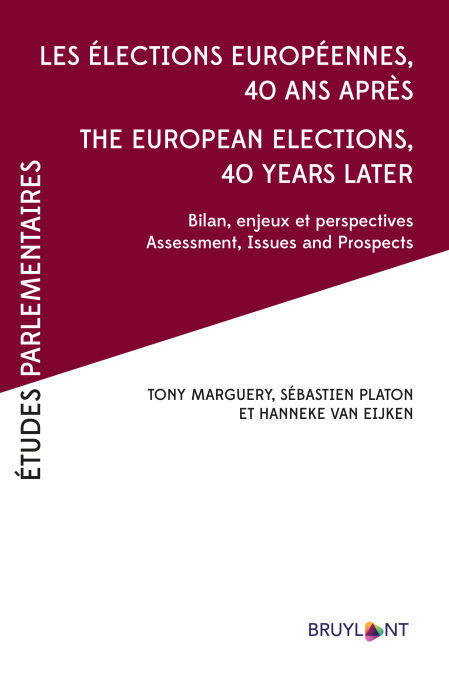
- Afhalen na 1 uur in een winkel met voorraad
- Gratis thuislevering in België vanaf € 30
- Ruim aanbod met 7 miljoen producten
- Afhalen na 1 uur in een winkel met voorraad
- Gratis thuislevering in België vanaf € 30
- Ruim aanbod met 7 miljoen producten
Zoeken
Les élections européennes 40 ans après – The European Elections, 40 years later E-BOOK
Tony Marguery, Sébastien Platon, Hanneke van Eijken
€ 74,99
+ 74 punten
Uitvoering
Omschrijving
En 2019, 40 ans après la première élection des membres du Parlement européen au suffrage universel direct en 1979, les citoyens de l’Union étaient une neuvième fois appelés aux urnes. Entre ces deux dates, le Parlement européen a profondément changé, passant d’une simple assemblée consultative au colégislateur de droit commun d’une Union européenne en proie à de nombreuses crises. Les contributions au présent ouvrage, tirées des travaux d’un colloque international qui s’est tenu à l’Université de Bordeaux les 9 et 10 mai 2019, entendent dresser le bilan, les enjeux et les perspectives, tant des élections européennes de 2019 que de la démocratie représentative européenne de façon globale.
In 2019, 40 years after the first election of members of the European Parliament by direct universal suffrage in 1979, the citizens of the Union were called to the polls for the ninth time. Between these two dates, the European Parliament changed dramatically, from a mere consultative assembly to the ordinary co-legislator of a European Union plagued by many crises. This book draws on an international conference held at the University of Bordeaux on May 9 and 10, 2019. The various contributions therein intend to take stock, examine the challenges and envisage the prospects, not only of the 2019 European elections but also of representative European democracy in general.
In 2019, 40 years after the first election of members of the European Parliament by direct universal suffrage in 1979, the citizens of the Union were called to the polls for the ninth time. Between these two dates, the European Parliament changed dramatically, from a mere consultative assembly to the ordinary co-legislator of a European Union plagued by many crises. This book draws on an international conference held at the University of Bordeaux on May 9 and 10, 2019. The various contributions therein intend to take stock, examine the challenges and envisage the prospects, not only of the 2019 European elections but also of representative European democracy in general.
Specificaties
Betrokkenen
- Auteur(s):
- Uitgeverij:
Inhoud
- Taal:
- Engels
- Reeks:
Eigenschappen
- Productcode (EAN):
- 9782802768357
- Verschijningsdatum:
- 27/09/2020
- Uitvoering:
- E-book
- Formaat:
- ePub

Alleen bij Standaard Boekhandel
+ 74 punten op je klantenkaart van Standaard Boekhandel
Beoordelingen
We publiceren alleen reviews die voldoen aan de voorwaarden voor reviews. Bekijk onze voorwaarden voor reviews.







